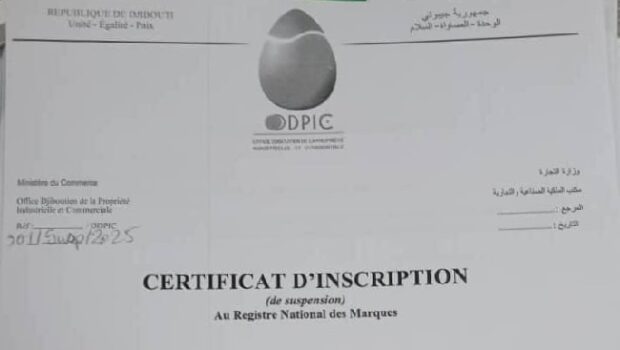
Djibouti : Article juridique – Suspension de l’activité de la société Marill Automotive et respect des droits de propriété industrielle à Djibouti
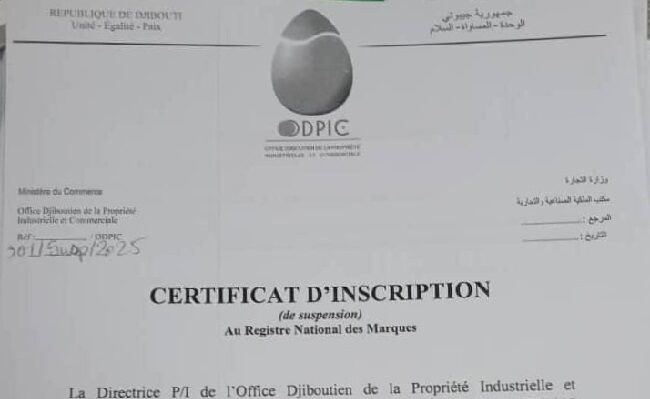
1. Cadre juridique applicable
Le régime de la propriété industrielle en République de Djibouti est régi par :
- Loi n°50/AN/08/6ème L du 19 juillet 2009 relative à la protection de la propriété industrielle.
- Décret n°2011-079/PR/MDCC portant application de ladite loi.
- Textes complémentaires (Loi n°159/AN/12/6ème L et Arrêté n°2012-169/PR/MDC).
Ces textes établissent les règles relatives à l’enregistrement, l’exploitation, la suspension et la protection des droits attachés aux marques, brevets et autres titres de propriété industrielle.
2. Nature de la décision de suspension
Le document fourni (Certificat d’inscription de suspension du 14/08/2025) indique que l’ODPIC a prononcé la suspension provisoire de l’exploitation de la marque Toyota par la société Marill Automotive SARL, en attendant l’issue d’une procédure judiciaire en cours.
Cette décision soulève plusieurs problématiques :
- Suspension administrative unilatérale : l’ODPIC a procédé à une suspension avant tout jugement définitif.
- Absence de décision judiciaire : la loi n°50/AN/08/6ème L prévoit que seul un tribunal compétent peut statuer sur les litiges concernant la validité ou l’usage d’une marque. L’ODPIC est un organe administratif et ne dispose pas, en principe, du pouvoir de retirer ou suspendre un droit acquis en dehors d’une décision de justice.
- Atteinte à la présomption de légalité du titre : tant qu’un titre (contrat exclusif ou marque enregistrée) n’a pas été annulé par un juge, il reste valable et opposable.
3. Droits de la société Marill Automotive
La société Marill Automotive bénéficie des droits suivants :
- Droit exclusif d’exploitation : garanti par le contrat d’exploitation exclusif et l’enregistrement auprès de l’ODPIC.
- Droit au respect de la sécurité juridique : une inscription au registre national des marques crée une présomption de légalité et de validité.
- Droit à un procès équitable : conformément à la Constitution djiboutienne et aux engagements internationaux (Pacte international relatif aux droits civils et politiques, art. 14), Marill Automotive ne peut être privée de ses droits sans une décision de justice équitable.
- Droit à la réparation : en cas de suspension abusive, Marill peut demander réparation pour préjudice économique, réputationnel et contractuel.
4. Violations potentielles et abus d’autorité
La suspension décidée par l’ODPIC pourrait être analysée comme :
- Une violation du droit de propriété industrielle : la loi protège les titulaires de marques contre toute atteinte illégale de leurs droits.
- Un abus de pouvoir administratif : l’ODPIC excède ses compétences en anticipant une décision judiciaire.
- Une atteinte au principe de séparation des pouvoirs : seule la justice est compétente pour statuer sur la validité d’un droit exclusif inscrit.
- Une violation du droit à la présomption de légalité : tant que la justice n’a pas tranché, Marill reste titulaire légitime du droit d’exploitation.
5. Voies de recours pour Marill Automotive
La société Marill peut :
- Former un recours gracieux ou hiérarchique auprès de l’ODPIC pour contester la suspension.
- Saisir le tribunal administratif de Djibouti pour excès de pouvoir, en demandant l’annulation de la décision.
- Engager une action en responsabilité contre l’ODPIC pour réparation du préjudice subi.
- Faire valoir ses droits devant la juridiction saisie du litige en cours, en produisant le certificat initial d’exploitation exclusif.
6. Conclusion
En droit djiboutien, l’ODPIC ne peut pas légalement suspendre l’activité ou les droits d’exploitation d’une société sans décision judiciaire préalable.
La suspension provisoire prononcée contre Marill Automotive SARL semble donc constituer :
- Un excès de pouvoir de l’administration,
- Une violation du droit de propriété industrielle,
- Et potentiellement un abus d’autorité.
Marill dispose de fondements solides pour contester la suspension et demander réparation devant les juridictions compétentes.
Hassan Cher
The English translation of the article in French.
Djibouti: Legal Article – Suspension of Marill Automotive’s Activity and Protection of Industrial Property Rights in Djibouti
1. Applicable Legal Framework
The industrial property regime in the Republic of Djibouti is governed by:
- Law No. 50/AN/08/6th L of 19 July 2009 on the protection of industrial property.
- Decree No. 2011-079/PR/MDCC implementing the above law.
- Complementary texts (Law No. 159/AN/12/6th L and Decree No. 2012-169/PR/MDC).
These texts establish the rules relating to the registration, exploitation, suspension, and protection of rights attached to trademarks, patents, and other industrial property titles.
2. Nature of the Suspension Decision
The provided document (Certificate of Suspension Registration dated 14/08/2025) indicates that the ODPIC (Djibouti Office of Industrial and Commercial Property) issued a provisional suspension of the exploitation of the Toyota trademark by Marill Automotive SARL, pending the outcome of ongoing judicial proceedings.
This decision raises several concerns:
- Unilateral administrative suspension: the ODPIC imposed a suspension prior to any final court ruling.
- Absence of judicial decision: Law No. 50/AN/08/6th L provides that only a competent court may rule on disputes concerning the validity or use of a trademark. ODPIC, as an administrative body, does not, in principle, have the authority to withdraw or suspend an acquired right without a court decision.
- Violation of the presumption of legality of the title: as long as a title (exclusive contract or registered trademark) has not been annulled by a judge, it remains valid and enforceable.
3. Rights of Marill Automotive
Marill Automotive enjoys the following rights:
- Exclusive right of exploitation: guaranteed by the exclusive exploitation agreement and the registration with ODPIC.
- Right to legal certainty: registration in the national trademark register creates a presumption of legality and validity.
- Right to a fair trial: pursuant to the Djiboutian Constitution and international commitments (International Covenant on Civil and Political Rights, Art. 14), Marill Automotive cannot be deprived of its rights without a fair judicial decision.
- Right to compensation: in the event of abusive suspension, Marill may claim damages for economic, reputational, and contractual losses.
4. Potential Violations and Abuse of Authority
The suspension decided by ODPIC may be characterized as:
- A violation of industrial property rights: the law protects trademark holders against any unlawful infringement of their rights.
- An abuse of administrative power: ODPIC exceeded its authority by anticipating a judicial ruling.
- A breach of the principle of separation of powers: only the judiciary is competent to decide on the validity of an exclusive registered right.
- A violation of the presumption of legality: until the judiciary rules otherwise, Marill remains the legitimate holder of the exploitation rights.
5. Remedies Available to Marill Automotive
Marill may:
- File an administrative or hierarchical appeal with ODPIC to contest the suspension.
- Bring an action before the Administrative Court of Djibouti for abuse of power, requesting annulment of the decision.
- Initiate liability proceedings against ODPIC to claim compensation for damages suffered.
- Assert its rights before the court handling the ongoing dispute, by producing the initial exclusive exploitation certificate.
6. Conclusion
Under Djiboutian law, ODPIC cannot lawfully suspend a company’s activities or exploitation rights without a prior judicial ruling.
The provisional suspension imposed on Marill Automotive SARL therefore appears to constitute:
- An abuse of administrative power,
- A violation of industrial property rights,
- And potentially an abuse of authority.
Marill has strong legal grounds to contest the suspension and seek compensation before the competent courts.
Hassan Cher
-
Pingback: 18/08/2025 (Brève 2516) HCH 24 – Marill dépouillé par la volonté du dictateur qui se croit au-dessus des Lois… – ARDHD


 Previous Article
Previous Article Next Article
Next Article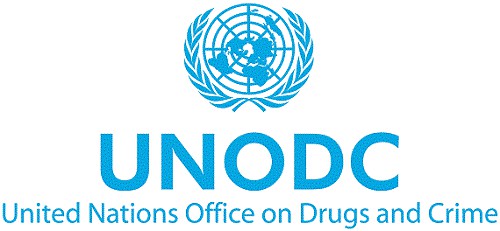 Afrique de l’Est : Atelier de renforcement de la coopération policière en Afrique de l’Est.
Afrique de l’Est : Atelier de renforcement de la coopération policière en Afrique de l’Est.  Éthiopie: la fête de l’Aïd sous tension
Éthiopie: la fête de l’Aïd sous tension  Djibouti/Somaliland: Mohamed Said Guedi disposé à collaborer avec l’international sur le trafic d’armes d’Ismael Omar Guelleh d’après ses proches.
Djibouti/Somaliland: Mohamed Said Guedi disposé à collaborer avec l’international sur le trafic d’armes d’Ismael Omar Guelleh d’après ses proches. 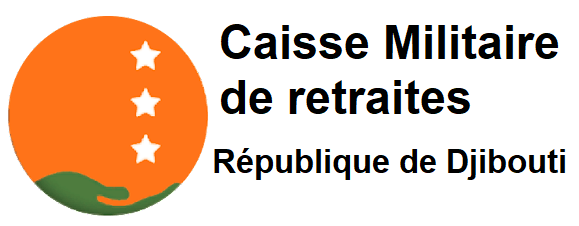 Djibouti/Armée : La casse du siècle à la Caisse Militaire de Retraites de Djibouti.
Djibouti/Armée : La casse du siècle à la Caisse Militaire de Retraites de Djibouti. 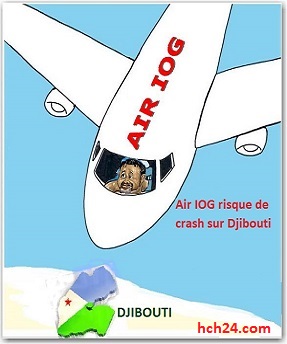 Djibouti : Les deux nouveaux jets d’Air Djibouti semblent être ceux d’Ivory jet repeints aux couleurs de la compagnie nationale.
Djibouti : Les deux nouveaux jets d’Air Djibouti semblent être ceux d’Ivory jet repeints aux couleurs de la compagnie nationale.  Djibouti: le fonds souverain de Djibouti servira à blanchir l’argent du trafic d’armes, de la drogue et du terrorisme
Djibouti: le fonds souverain de Djibouti servira à blanchir l’argent du trafic d’armes, de la drogue et du terrorisme 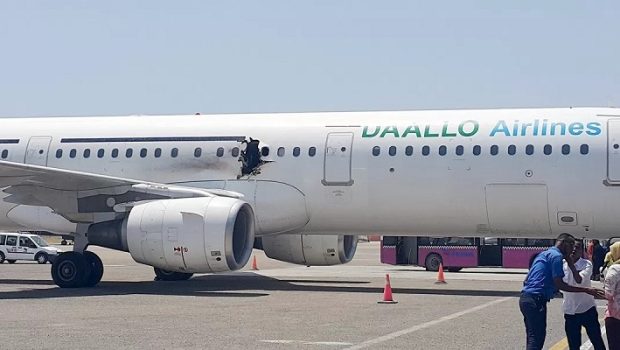 Djibouti/Sécurité Aérienne : l’Agence de la sécurité aérienne de l’Union européenne (AESA) vient de mettre Djibouti sur la liste des pays…
Djibouti/Sécurité Aérienne : l’Agence de la sécurité aérienne de l’Union européenne (AESA) vient de mettre Djibouti sur la liste des pays…  Fathia Boukao, voix libre pour Djibouti, ciblée par les réseaux du régime de Guelleh ?
Fathia Boukao, voix libre pour Djibouti, ciblée par les réseaux du régime de Guelleh ?